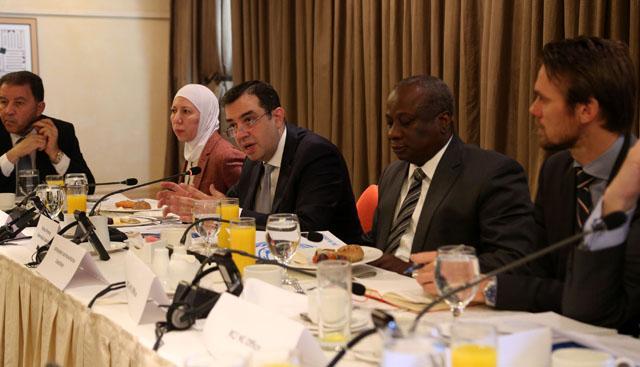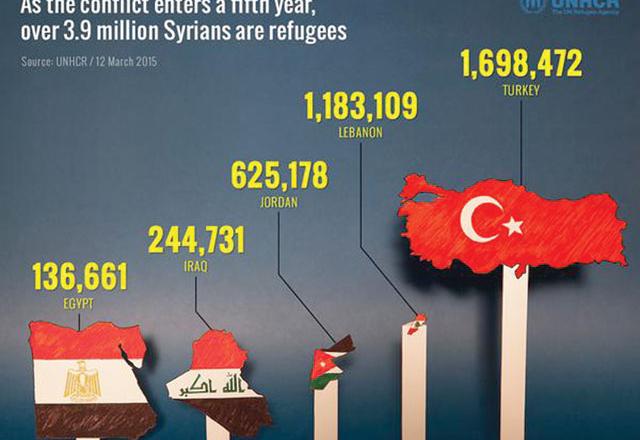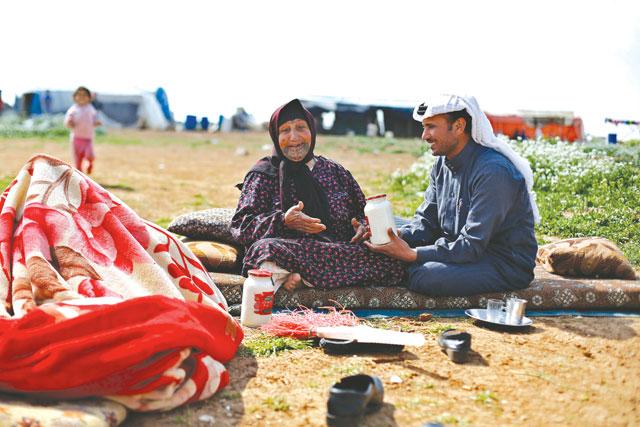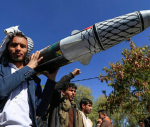You are here
World should not take Jordan’s generosity for granted — officials, relief workers
By Khetam Malkawi - Nov 15,2015 - Last updated at Nov 15,2015
AMMAN — Economists and UN officials feel that the international community is taking Jordan's generosity for granted and not supporting the Kingdom enough in sharing the unprecedented burden of hosting thousands of Syrian refugees.
In interviews with The Jordan Times, they said the Syrian crisis is an international one — not a Jordanian issue — and, therefore, all donors should be involved to mitigate its impact.
Last week, Planning and International Cooperation Minister Imad Fakhoury described as "disgraceful" the volume of support to Jordan as "it has been shouldering the burdens of the Syrian refugee crisis on behalf of the region and world".
At a press conference on the sidelines of the Resilience Development Forum, organised by the UNDP at the Dead Sea, Fakhoury said it is time for the international community to respond in a better way to the Kingdom's financing needs to continue offering services to hundreds of thousands of Syrian refugees, noting that Jordan was the first country in the region to prepare a response plan for the Syrian crisis.
This statement was supported by Andrew Harper, the UNHCR representative to Jordan, who noted that “we have warned that Jordan has to be treated with generosity as it is shouldering an international burden and is delivering an international good for an international crisis.”
The UNHCR, Harper said, is coordinating the international support.
“We have been very much” advocating in all capitals to continue to provide support for Jordan, he noted.
However, the UN official added that one of the reasons that have driven refugees to go to Europe is the insufficient support provided by the international community to Jordan and the World Food Programme (WFP) in particular to mitigate the impact of the crisis.
He argued that taking countries like Jordan for granted is a reflection of the lack of understanding by the international community of the consequences of insufficient support in this international crisis.
“It makes sense to Europe to provide support for Jordan and provide protection and support to refugees or they will move further to the north,” the UN official said, adding that “Europe now is waking up”.
“How can we best mitigate the movement that has become an issue?” Harper asked, noting that this can be done by providing refugees with a sense of dignity and not at the expense of Jordanians.
“It is better to invest in Jordan rather than finding a solution for the thousands of refugees that are moving to Europe.”
The direct and indirect cost of the Syrian crisis on the Kingdom’s Treasury and economy has so far reached $6.6 billion, according to Fakhoury.
Pledges for the 2015 Jordan Response Plan by donors cover only 36 per cent of the required funding, estimated at $2.9 billion, while funding for host communities across the Kingdom covers only 8 per cent.
“It is a shame and we cannot accept this. Funding should be complete or at least enough to enable us to cope with the refugee burden,” Fakhoury said last week.
He added that funding required for the 2016-2018 response plan was estimated at $8 billion — $2.5 billion for humanitarian needs, $2.5 billion in financial support to host communities and $3 billion to compensate the Treasury for the burdens it is going to bear.
‘Arguing for integration’
Jawad Anani, a prominent economist, agreed with the minister’s statements, noting that the issue is not only related to financial support.
If the international community’s support is little because it is “complaining about fatigue; what about us? This is not justified,” said Anani, a senator.
He pointed out that despite the shortage in support, the international community is also trying to put more pressure on Jordan.
“European countries and world economies are pressuring Jordan to integrate Syrian refugees into its economy and explaining to us the advantages of doing this,” the former Royal Court chief said.
“How are we going to integrate an additional 1.4 million Syrians when we can’t cope with our unemployment and poverty at the first place? That can’t be accepted.”
For the WFP, which has been struggling to maintain services provided to Syrian refugees over the past five years, Jordan’s generosity was not equally reciprocated through sufficient funding.
Shada Moghrabi, WFP spokesperson, said current resources are simply not enough to address the vast volume of needs.
Despite the chronic funding challenges WFP faced throughout this year, new donor contributions enabled the agency to increase the value of assistance to extremely vulnerable Syrian refugees in Jordan from JD10 to JD15 last month and reinstate assistance to 229,000 vulnerable Syrian refugees who stopped receiving food vouchers in September due to a shortage of funds.
Still, according to Moghrabi, these contributions will only allow the agency to continue providing assistance up to January 2016, and “if we don’t receive more funds, WFP may not be able to provide its vital assistance to those who desperately need it beyond the next two months.”
“It is imperative that the international community invests in programmes that not only build the resilience of refugees in Jordan but also the resilience of Jordanians to cope with implications of the crisis,” she said.
“That said, the plight of refugees and the impact it [has] had on Jordan and other host countries can only be alleviated when a political solution to [the] crisis is reached,” Moghrabi added.
Not just ‘sardines and bread’
But, according to Prime Minister Abdullah Ensour, Jordan needs more than just “sardines and bread” to deal with the impact of the crisis.
“This is not the type of support that Jordan needs,” he said at last week’s Resilience Development Forum.
Ensour highlighted the impact of the Syrian crisis on the Kingdom’s budget, and the overcrowding of schools and health facilities, in addition to its effect on drug trafficking.
However, the social impact of the crisis cannot be compensated, he said.
According to Munther Shara, president of the Economic and Social Council, the crisis has had a huge impact on society, especially in the northern governorates that host most of the refugees.
The former water and political development minister noted that many Jordanian women who took loans to implement small-sized projects are unable to pay them back, as Syrian women are competing with their enterprises, and so they are unable to make the profit they need to break even.
In addition, 150,000 Syrians work in the local market now, and this — “unfortunately” — has contributed to increasing the unemployment rate to 14 per cent from 11 per cent, Shara said.
‘Mobilising resources’
Other UN officials acknowledged that the support Jordan receives is not enough, but said they are doing their best to mobilise resources.
UNICEF Representative to Jordan Robert Jenkins said the agency is “working... to expand access of students to education”.
He blamed the shortfall in funds on other global crises that have taken up some of the international community’s attention.
“We will continue to work closely with the international community to ensure that they provide resources so that children can access decent services and [are] provided with protection,” Jenkins added.
He stressed that the Jordanian government’s actions merit applause for its generosity and for what it is doing not only for Syrians, but also other refugees in Jordan.
Meanwhile, Edward Kallon, UN resident and humanitarian coordinator in Jordan, said the international community has over the past years demonstrated extreme generosity towards the people of Jordan, and more than $1 billion has been committed to the Jordan Response Plan in 2015.
“This is in addition to the generous bilateral support Jordan is receiving from the international community,” Kallon said in remarks sent by e-mail.
He argued that financial support has not been reduced; rather, global crises have grown, “meaning donors have to put resources into many areas of need around the world. Overall, the international support has increased.”
The official said the UN continues to advocate for burden sharing and safeguarding of Jordan’s development gains through supporting host communities and building resilience.
He noted that the challenge for Jordan will be to leverage a multiplicity of funding channels to address humanitarian and development priorities.
“There is a broad consensus that humanitarian funding will never be sufficient to address the magnitude of the crisis, and I have therefore been adamant in calling on the international community and the UN system to also leverage development financing streams to better position Jordan to meet the emerging needs and tackle the impact of the Syria crisis,” Kallon added.
Omar Obeidat contributed to this report.
Related Articles
The Syrian crisis has placed, and continues to place, an overwhelming burden on Jordan, and the Kingdom cannot meet this challenge without the strong engagement and continued generosity of partners, Planning Minister Imad Fakhoury said on Monday.
With the Syrian crisis entering its fifth year this week, hosting refugees in neighbouring countries, including Jordan, is becoming more challenging, UN officials have said.
Although Jordan is committed to providing Syrian refugees with every assistance possible, mitigating the negative impact of the crisis comes at a cost as the burden is stretching the country’s resources to the limit, top officials said on Monday.
















